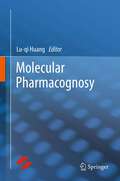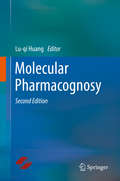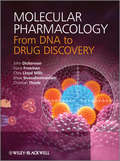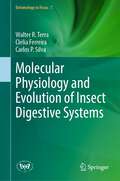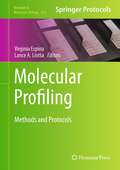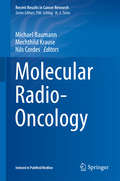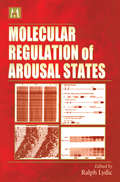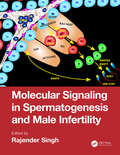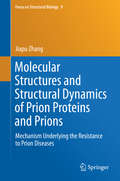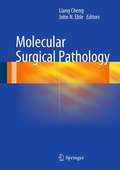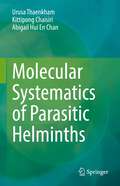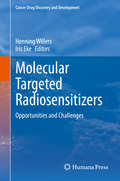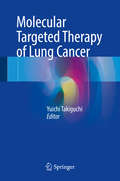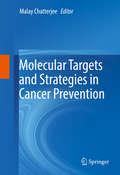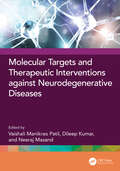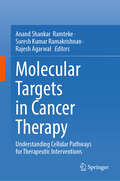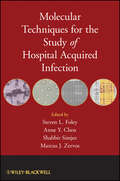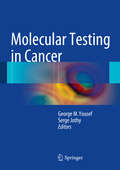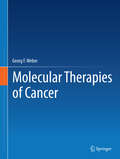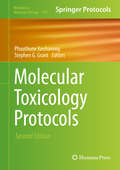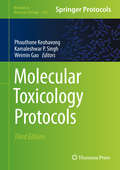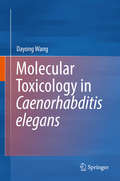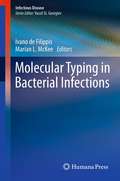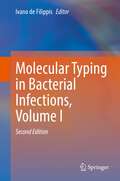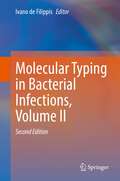- Table View
- List View
Molecular Pharmacognosy
by Lu-Qi Huang"Molecular Pharmacognosy" discusses the application of molecular biology in resource science and authentication of traditional Chinese medicine (TCM). This book reviews the latest developments in pharmacognosy, introduces a series of new views and insights, presents the hotspots and focus of the field of study on molecular pharmacognosy, and predicts a new direction of study on the resource science of TCM. Furthermore, the book also provides an open communications platform for the development of molecular pharmacognosy. This book is intended for biomedical scientists and researchers in the fields of molecular biology, traditional medicine and natural pharmaceutics. Professor Lu-qi Huang is Director of the Collaborating Centre of the World Health Organization for Traditional Medicine (Chinese Materia Medica) and Vice-Chairman of the Australia Chinese Association for Biomedical Sciences Inc.
Molecular Pharmacognosy
by Lu-Qi HuangThis book discusses the application of molecular biology in resource science and authentication of traditional Chinese medicine (TCM). It also reviews the latest developments in pharmacognosy, introduces new perspectives and insights, discusses the hotspots and focuses in the field of molecular pharmacognosy, and predicts new directions of study. In the last five years, the technologies and scope of molecular pharmacognosy have constantly expanded and evolved. As such, this new edition includes extra content, such as the molecular phylogeography of medicinal plants, functional genome of medicinal plants, and synthetic biology of active compounds. Elucidating the concept, theory, and methodology of molecular pharmacognosy, it promotes the full use of the newly developed technologies and methodologies within the framework of molecular pharmacognosy to solve problems in the field.
Molecular Pharmacology
by Chris Lloyd Mills John Dickenson Shiva Sivasubramaniam Fiona Freeman Christian ThodeThis textbook provides a fresh, comprehensive and accessible introduction to the rapidly expanding field of molecular pharmacology. Adopting a drug target-based, rather than the traditional organ/system based, approach this innovative guide reflects the current advances and research trend towards molecular based drug design, derived from a detailed understanding of chemical responses in the body. Drugs are then tailored to fit a treatment profile, rather than the traditional method of 'trial and error' drug discovery which focuses on testing chemicals on animals or cell cultures and matching their effects to treatments. Providing an invaluable resource for advanced under-graduate and MSc/PhD students, new researchers to the field and practitioners for continuing professional development, Molecular Pharmacology explores; recent advances and developments in the four major human drug target families (G-protein coupled receptors, ion channels, nuclear receptors and transporters), cloning of drug targets, transgenic animal technology, gene therapy, pharmacogenomics and looks at the role of calcium in the cell. Current - focuses on cutting edge techniques and approaches, including new methods to quantify biological activities in different systems and ways to interpret and understand pharmacological data.Cutting Edge - highlights advances in pharmacogenomics and explores how an individual's genetic makeup influences their response to therapeutic drugs and the potential for harmful side effects.Applied - includes numerous, real-world examples and a detailed case-study based chapter which looks at current and possible future treatment strategies for cystic fibrosis. This case study considers the relative merits of both drug therapy for specific classes of mutation and gene therapy to correct the underlying defect.Accessible - contains a comprehensive glossary, suggestions for further reading at the end of each chapter and an associated website that provides a complete set of figures from within the book.A companion website with additional resources is available at www.wiley.com/go/dickenson/dnamolecular
Molecular Physiology and Evolution of Insect Digestive Systems (Entomology in Focus #7)
by Walter R. Terra Clelia Ferreira Carlos P. SilvaThis book provides a unique blend of data on insect life spans, physiology, enzymology and other molecular features associated with digestion and nutrient absorption to enrich the knowledge on insects and to disclose putative molecular targets for the development of new insect control technologies and for improving insect raising procedures to be used as food and feed. With this aim, the book overviews the types of diets consumed by insects, describing their chemical components demanding digestion and discusses the evolutionary selective pressures on insects associated with feeding. Digestive enzymes are classified and detailed according to their activity on substrates and their evolutionary protein families. The technical details on how to obtain reliable enzymological parameters are discussed. The book reviews the structural changes in enzymes associated with the adaptation of insects to new diets and in avoiding natural plant inhibitors. Midgut features that enhance digestive and nutrient absorption efficiency and their underlying molecular mechanisms are described regarding insects pertaining to key points in evolution. Evolutionary trends of the mechanisms of digestion and nutrient absorption are discussed.
Molecular Profiling
by Virginia Espina Lance A. LiottaThe next revolution in molecular medicine is the application of molecular profiling to individualized patient therapy. Molecular profiling technology has advanced dramatically, particularly in the field of cancer tissue biomarkers. It is now possible to gather complex genomic and proteomic information from a routine clinical needle biopsy or surgical specimen. In Molecular Profiling : Methods and Protocols, expert researchers in the field focus on the entire process from discovery to commercialization, with practical guides that are not limited to experimental methods. Written in the highly successful Methods in Molecular BiologyTM series format, chapters include introductions to their respective topics, lists of the necessary materials and reagents, step-by-step, readily reproducible laboratory protocols, as well as essays and guidelines for grants, patents, and commercialization of products related to molecular profiling. Authoritative and practical, Molecular Profiling: Methods and Protocols seeks to aid scientists in understanding the latest advancements in genomics, proteomics, imagining, and bioinformatics.
Molecular Radio-Oncology
by Michael Baumann Mechthild Krause Nils CordesThis book concisely reviews our current understanding of hypoxia, molecular targeting, DNA repair, cancer stem cells, and tumor pathophysiology, while also discussing novel strategies for putting these findings into practice in daily clinical routine. Radiotherapy is an important part of modern multimodal cancer treatment, and the past several years have witnessed not only substantial improvements in radiation techniques and the use of new beam qualities, but also major strides in our understanding of molecular tumor biology and tumor radiation response. Against this backdrop, the book highlights recent efforts to identify reasonable and clinically applicable biomarkers using broad-spectrum tissue microarrays and high-throughput systems biology approaches like genomics and epigenomics. In particular, it describes in detail how such molecular information is now being exploited for diagnostic imaging and imaging throughout treatment using the example of positron emission tomography. By discussing all these issues in the context of modern radiation oncology, the book provides a broad, up-to-date overview of the molecular aspects of radiation oncology that will hopefully foster its further optimization.
Molecular Regulation of Arousal States
by Ralph LydicArousal states are processes that include waking, deep sleep, and the dreaming phase of sleep (REM). Molecular Regulation of Arousal States explores the cellular and molecular mechanisms by which sleep and wakefulness are regulated and seeks explanations for the generation of arousal states. It presents step-by-step research protocols that allow investigators to apply the techniques described to a wide range of physiological and behavioral research problems, such as sleep neurobiology and state-dependent disruption of cardiopulmonary control. For the first time, a single source integrates cellular and molecular research techniques with studies of arousal, opening the door to exciting new research methodologies.
Molecular Signaling in Spermatogenesis and Male Infertility
by Rajender SinghSpermatogenesis involves the coordination of a number of signaling pathways, which culminate into production of sperm. Its failure results in male factor infertility, which can be due to hormonal, environmental, genetic or other unknown factors. This book includes chapters on most of the signaling pathways known to contribute to spermatogenesis. Latest research in germ cell signaling like the role of small RNAs in spermatogenesis is also discussed. This book aims to serve as a reference for both clinicians and researchers, explaining possible causes of infertility and exploring various treatment methods for management through the basic understanding of the role of molecular signaling. Key Features Discusses the signaling pathways that contribute to successfulspermatogenesis Covers comprehensive information about Spermatogenesis atone place Explores the vital aspects of male fertility and infertility Explains the epigenetic regulation of germ cell developmentand fertility Highlights the translational opportunities in molecular signalingin testis
Molecular Structures and Structural Dynamics of Prion Proteins and Prions
by Jiapu ZhangThis monograph is the first easy-to-read-and-understand book on prion proteins' molecular dynamics (MD) simulations and on prions' molecular modelling (MM) constructions. It enables researchers to see what is crucial to the conformational change from normal cellular prion protein (PrPC) to diseased infectious prions (PrPSc), using MD and MM techniques. As we all know, prion diseases, caused by the body's own proteins, are invariably fatal and highly infectious neurodegenerative diseases effecting humans and almost all animals for a major public health concern. Prion contains no nucleic acids and it is a misshapen or conformation-changed protein that acts like an infectious agent; thus prion diseases are called "protein structural conformational" diseases. PrPC is predominant in α-helices but PrPSc are rich in β-sheets in the form as amyloid fibrils; so very amenable to be studied by MD techniques. Through MD, studies on the protein structures and the structural conversion are very important for revealing secrets of prion diseases and for structure-based drug design or discovery. Rabbits, dogs, horses and buffaloes are reported to be the few low susceptibility species to prion diseases; this book's MD studies on these species are clearly helpful to understand the mechanism underlying the resistance to prion diseases. PrP(1-120) usually has no clear molecular structures; this book also studies this unstructured region through MD and especially MM techniques from the global optimization point of view. This book is ideal for practitioners in computing of biophysics, biochemistry, biomedicine, bioinformatics, cheminformatics, materials science and engineering, applied mathematics and theoretical physics, information technology, operations research, biostatistics, etc. As an accessible introduction to these fields, this book is also ideal as a teaching material for students.
Molecular Surgical Pathology
by Liang Cheng John N. EbleMolecular Surgical Pathology provides a concise review of recent advancement of molecular pathology in each organ system. The text is intended as a "first knowledge base" in the rapidly evolving field of molecular pathology and is organized in a user friendly outline format. Each chapter is organ-based and covers important aspects of molecular pathology and its impact on our daily practice of surgical pathology. The topics presented herein constitute the fundamentals and core base of knowledge required for the daily practice of surgical pathology. This book focuses on the practical utilities of molecular techniques and molecular biomarkers in daily practice of surgical pathology. The emphasis is on the impact of molecular pathology for tumor classification, diagnosis and differential diagnosis as well as its implications for patient management and personalized care. Numerous tables, diagrams and color illustrations are included throughout. Molecular Surgical Pathology will prove a very useful resource for pathologists in training who are preparing for the Board and in-service examination. It will also be a unique and invaluable resource for medical oncologists, physicians, other medical professionals and basic research scientists with interest in molecular pathology of human cancers.
Molecular Systematics of Parasitic Helminths
by Urusa Thaenkham Kittipong Chaisiri Abigail Hui En ChanThis book aims to provide fundamental knowledge and information for research in molecular systematics on parasitic helminths (nematode, trematode, cestode). The shreds of evidence of molecular systematics studies will be compiled and discussed in terms of the utilities and pitfalls of the genetic marker used for various purposes, which have been implemented for molecular systematics of parasitic nematodes, cestodes, and trematodes. Moreover, this book will also provide the procedure for research on molecular systematics and DNA taxonomy as the guideline to explore parasitic helminths. Finally, the further perspectives of utilizing genetic markers for molecular studies on parasitic helminths will be addressed in the context of applications from the laboratory to fieldwork such as DNA barcoding and environmental DNA metabarcoding of parasitic helminths. The book will benefit postgraduate students and researchers requiring the detailed knowledge of molecular systematics, as well as researchers desiring a guideline to select genetic markers and analyze DNA sequences to make phylogenetic inferences
Molecular Targeted Radiosensitizers: Opportunities and Challenges (Cancer Drug Discovery and Development)
by Henning Willers Iris EkeMolecular Targeted Radiosensitizers: Opportunities and Challenges provides the reader with a comprehensive review of key pre-clinical research components required to identify effective radiosensitizing drugs. The book features discussions on the mechanisms and markers of clinical radioresistance, pre-clinical screening of targeted radiosensitizers, 3D radiation biology for studying radiosensitizers, in vivo determinations of local tumor control, genetically engineered mouse models for studying radiosensitizers, targeting the DNA damage response for radiosensitization, targeting tumor metabolism to overcome radioresistance, radiosensitizers in the era of immuno-oncology, and more. Additionally, the book features discussions on high-throughput drug screening, predictive biomarkers, pre-clinical tumor models, and the influence of the tumor microenvironment and the immune system, with a specific focus on the challenges radiation oncologists and medical oncologists currently face in testing radiosensitizers in human cancers. Edited by two acclaimed experts in radiation biology and radiosensitizers, with thirteen chapters contributed by experts, this new volume presents an in-depth look at current developments within a rapidly moving field, with a look at where the field will be heading and providing comprehensive insight into the framework of targeted radiosensitzer development. Essential reading for investigators in cancer research and radiation biology.
Molecular Targeted Therapy of Lung Cancer
by Yuichi TakiguchiThis book discusses the latest molecular targeted therapy of lung cancer including its evaluation and future directions. It clearly illustrates the initial dramatic effectiveness of molecular targeted therapy, recurrence of the disease, overcoming the wide variety of resistance mechanisms using new-generation molecular targeted agents and potential novel approaches. It also outlines the increasing necessity for new diagnostic technology and strategies for managing different adverse effects and novel methods for evaluating effectiveness and safety. Edited and authored by opinion leaders, Molecular Targeted Therapy of Lung Cancer provides a comprehensive overview of the disease and its treatments. It is a valuable resource for graduate students, post-doctoral fellows and faculty staff, as well as researchers involved in clinical and translational research on lung cancer, helping promote new ideas for further advances.
Molecular Targets and Strategies in Cancer Prevention
by Malay ChatterjeeThe book focuses on the understanding of molecular pathways by which normal cell progress to the definable stage of cancer. The chapters explore microbiota and chronic inflammation, multiple myeloma chemoprevention, microRNAs, cancer regulation, liquid biopsies, and angiogenesis. Recent advances of molecular risk assessment, tumor microenvironment, microneoplasia, malignant gene expressions are highlighted to provide a means and design of future cancer prevention strategies and challenges thereupon. The volume also explores various receptor drugs that are in development process with the emphasis of inhibitors used to prevent malignant gene expression. The book bridges the gap between basic science and clinical application of current knowledge of cancer and emphasizes that tumor progression and cancer metastasis are not random - treatments and cure are logical and eventual. Expertly authored and drawing from a wealth of international perspectives, Molecular Targets and Strategies in Cancer Prevention is invaluable reading for clinicians and researchers in the fields of oncology and molecular biology.
Molecular Targets and Therapeutic Interventions Against Neurodegenerative Diseases
by Vaishali Manikrao Patil, Dileep Kumar, and Neeraj MasandThis book comprehensively explores the latest advancements in the understanding, diagnosis, and treatment of neurodegenerative diseases. The chapters provide an in-depth review of current approaches and treatment strategies for Alzheimer's disease, offering insights into the latest developments and breakthroughs. It also reviews the cutting-edge research on potential novel targets for Alzheimer's pharmacotherapy, with a focus on JNK3, GSK3β, and Fyn kinase inhibitors, providing an update on related approaches and their implications. It discusses the potential of ethnomedicines as a promising tool for mitigating Alzheimer's disease, offering insights into traditional remedies and their modern applications. Additional chapters explore the influence of microglia, the neuropharmacological mechanisms associated with SARS-CoV-2, and the molecular intricacies of Parkinson’s disease. The book further covers the evolving role of artificial intelligence and machine learning in the management of neurodegenerative disorders. The chapters also examine the role of nanotechnology in addressing the challenges of diseases like multiple sclerosis. Towards the end, the book examines the role of oxidative damage in neurodegeneration and its management in related disorders. This book is an important source for neuroscientists, neurologists, and students of neuroscience.
Molecular Targets in Cancer Therapy: Understanding Cellular Pathways for Therapeutic Interventions
by Anand Shankar Ramteke Suresh Kumar Ramakrishnan Rajesh AgarwalCancer continues to be a major global health challenge. Recent breakthroughs in molecular biology and multi-omics technologies have revolutionized the understanding of disease pathology and treatment modalities. Molecular Targets in Cancer Therapy is a cutting-edge resource that explores the rapidly evolving landscape of targeted cancer treatments, offering critical insights into the molecular mechanisms driving tumors growth and progression. This comprehensive book brings together contributions from leading cancer researchers who examine a wide range of molecular targets— that are involved in hallmarks of cancer, i.e. cell signalling pathways, angiogenesis, cell death pathways, epithelial mesenchymal transitions, telomerase, immune signalling, metabolic attributes etc. Each chapter delves into the biological rationale, current therapeutic strategies, and clinical implications of targeting these molecules, offering readers both foundational knowledge and the latest advances in the field.
Molecular Techniques for the Study of Hospital Acquired Infection
by Anne Y. Chen Marcus J. Zervos Steven L. Foley Shabbir SimjeeProviding a broad overview of the microbial pathogens associated with hospital-acquired human illness, Techniques for the Study of Hospital Acquired Infection examines the cost-effective use of laboratory techniques in nosocomial infectious disease epidemiology and control. This concise guide addresses the cost benefits of combining modern molecular techniques with the traditional activities of infection control departments. The book is useful as a guide to hospital infection control programs as well as a text for medical practitioners, grad/medical students, researcher scientists, population biologists, molecular biologists, and microbiologists.
Molecular Testing in Cancer
by George M. Yousef Serge JothyMolecular Testing in Cancer provides a state of the art review of clinically relevant molecular pathology in cancer. The book provides a brief, easy to read review of commonly employed diagnostic molecular techniques including recently developed "next generation" analytic tools, and offers a system-based run-through of the utility of molecular testing in individual cancer types, as well as reviewing current markers in cancer diagnosis, prognosis, and management. The volume also provides a prospective for the future which includes recently characterized and emerging biomarkers. Written by experts in the field, Molecular Testing in Cancer serves as a useful and comprehensive resource for pathologists, hematologists, laboratory technicians and molecular scientists.
Molecular Therapies of Cancer
by Georg F. WeberMolecular Therapies of Cancer comprehensively covers the molecular mechanisms of anti-cancer drug actions in a comparably systematic fashion. While there is currently available a great deal of literature on anti-cancer drugs, books on the subject are often concoctions of invited review articles superficially connected to one another. There is a lack of comprehensive and systematic text on the topic of molecular therapies in cancer. A further deficit in the relevant literature is a progressive sub-specialization that typically limits textbooks on cancer drugs to cover either pharmacology or medicinal chemistry or signal transduction, rather than explaining molecular drug actions across all those areas; Molecular Therapies of Cancer fills this void. The book is divided into five sections: 1. Molecular Targeting of Cancer Cells; 2. Emerging and Alternative Treatment Modalities; 3. Molecular Targeting of Tumor-Host Interactions; 4. Anti-Cancer Drug Pharmacokinetics; and 5. Supportive Therapies.
Molecular Toxicology Protocols
by Phouthone Keohavong Stephen G. GrantA collection of cutting-edge techniques for analyzing genotoxic exposure and detecting the resulting biological effects-including endogenous metabolites-up to and including the development of cancer. The authors emphasize analytical methods that can be specifically applied to human populations and patients. Among the applications detailed are the analysis of interactions between such cellular macromolecules as DNA and proteins and chemical and physical agents, the assessment of medically relevant toxicity, and the characterization of genetic alterations induced in transgenic animals by in vivo systems. There are also methods for the analysis of genotoxic exposure during gene expression, of cytotoxicity caused by the induction of apoptosis, of genetic alterations in reporter genes and oncogenes, early (premalignant) detection of altered oncogenes, and of individual variation in biotransformation and DNA repair capacity.
Molecular Toxicology Protocols (Methods in Molecular Biology #2102)
by Phouthone Keohavong Kamaleshwar P. Singh Weimin GaoThis fully revised book includes new and improved protocols to analyze toxicity at the DNA, RNA, and protein levels using genomic, epigenomic, transcriptomic, and proteomic approaches. Sections of the book address key subjects such as bioinformatics and biostatistics, toxicant-induced lung inflammation and tumors, analysis of protein and gene expression and silencing, gene promoter methylation, detection of chromosomal and genome-wide damage, analysis of DNA-adducts and surrogate gene mutations, detection and characterization of cancer gene mutation, and many other areas of study. Written for the highly successful Methods in Molecular Biology series, chapters include introductions to their respective topics, lists of the necessary materials and reagents, step-by-step, readily reproducible laboratory protocols, and tips on troubleshooting and avoiding known pitfalls. Comprehensive and up-to-date, Molecular Toxicology Protocols, Third Edition will prove to play an important role in generating a better understanding of the field of toxicology and its sub-disciplines.
Molecular Toxicology in Caenorhabditis elegans
by Dayong WangThis book will focus on the molecular basis of oxidative stress induced by toxicants or stresses and various molecular signalling pathways in regulating the toxicity of toxicants or stresses in Caenorhabditis elegans. It will also cover the discussion on the aspects of response signals, G-protein coupled receptors and ion channels, specific molecular signals, and epigenetic signals involved in the regulation of toxicity from toxicants or stresses. The molecular basis for adaptive response for transgenerational toxicity of environmental toxicants or stresses will be further discussed. Nematode Caenorhabditis elegans is a classic model animal with well-described genetic and developmental backgrounds based on the study of life science, and has been further successfully and widely used in both toxicity assessment and toxicological study of various environmental toxicants or stresses. Based on related available data, this book aims at providing a systematic understanding of the knowledge system of molecular toxicology in C. elegans.
Molecular Typing in Bacterial Infections
by Marian L. Mckee Ivano De FilippisMolecular Typing in Bacterial Infections covers common bacterial pathogenic agents, with the most effective methods for their identification and classification in the light of their specific epidemiology. The book will be a valuable resource for molecular typing of infectious diseases agents encountered in both the research and hospital clinical lab settings, as well as culture collections. Each chapter provides an overview of molecular approaches to typing bacterial pathogens. Part I gives a general overview of typing methods used in the traditional microbiology laboratory in comparison to molecular methods of epidemiology. In Part II, the relative strengths and weaknesses of the different methods applicable to the specific agents of infectious diseases are emphasized. Specific emphasis is placed on recent changes and updates in molecular typing.
Molecular Typing in Bacterial Infections, Volume I
by Ivano De FilippisThis updated second edition of Molecular Typing in Bacterial Infections, presented in two volumes, covers both common and neglected bacterial pathogenic agents, highlighting the most effective methods for their identification and classification in the light of their specific epidemiology. New chapters have been included to add new species, as well as another view of how bacterial typing can be used. These books are valuable resources for the molecular typing of infectious disease agents encountered in both research and hospital clinical laboratory settings, as well as in culture collections and in the industry. Each of the 21 chapters provides an overview of specific molecular approaches to efficiently detect and type different bacterial pathogens. The chapters are grouped in five parts, covering respiratory and urogenital pathogens (Volume I), and gastrointestinal and healthcare-associated pathogens, as well as a new group of vector-borne and Biosafety level 3 pathogens including a description of typing methods used in the traditional microbiology laboratory in comparison to molecular methods of epidemiology (Volume II). Comprehensive and updated, Molecular Typing in Bacterial Infections provides state-of-the-art methods for accurate diagnosis and for the correct classification of different types which will prove to be critical in unravelling the transmission routes of human pathogens.
Molecular Typing in Bacterial Infections, Volume II
by Ivano De FilippisThis updated second edition of Molecular Typing in Bacterial Infections, presented in two volumes, covers both common and neglected bacterial pathogenic agents, highlighting the most effective methods for their identification and classification in the light of their specific epidemiology. New chapters have been included to add new species, as well as another view of how bacterial typing can be used. These books are valuable resources for the molecular typing of infectious disease agents encountered in both research and hospital clinical laboratory settings, as well as in culture collections and in the industry. Each of the 21 chapters provides an overview of specific molecular approaches to efficiently detect and type different bacterial pathogens. The chapters are grouped in five parts, covering respiratory and urogenital pathogens (Volume I), and gastrointestinal and healthcare-associated pathogens, as well as a new group of vector-borne and Biosafety level 3 pathogens including a description of typing methods used in the traditional microbiology laboratory in comparison to molecular methods of epidemiology (Volume II). Comprehensive and updated, Molecular Typing in Bacterial Infections provides state-of-the-art methods for accurate diagnosis and for the correct classification of different types which will prove to be critical in unravelling the transmission routes of human pathogens.
